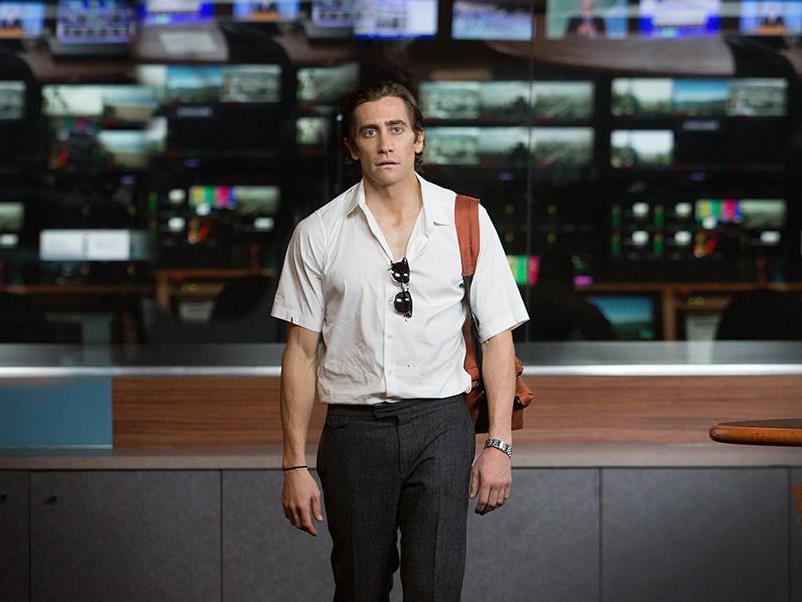Image: supplied
When darkness descends on Los Angeles, the city’s lights may shine brighter, but so does the glare of its seedy underbelly. The glamour of the former attracts the starkness of the latter: the perception, and the reality. It is with these images that writer/director Dan Gilroy sets Nightcrawler into motion, gliding through urban landscapes cloaked by the evening sky but bustling with immoral activity. This is the film’s playground and that of its protagonist, the home of all things hopeful housing an anti-hero as menacing as he is mesmerising.
With a dead-on stare never dampening the stars in his eyes, Lou Bloom (Jake Gyllenhaal, Enemy) sets his sights on success at any cost and by whatever means necessary. Anything with a financial reward that falls into his purview, he pursues with passion and perseverance, never stopping until he reaches his desired outcome. He roughs up a security guard who tries to hinder his pilfering of chain-link fencing to sell for a profit. He barters with the cautious recipient of his stolen wares, trying to turn their transaction into a job opportunity. Then brightness flickers across his brow as he stumbles across a group of scavengers of the night: news cameramen. They trawl the streets and scroll through police scanners to find and film the latest and greatest emergencies – and get it to hungry news stations before anyone else, turning their rummaging into a cash reward and fuelling the voracious 24-hour information cycle.
Lou’s gaze isn’t just unnerving in conveying his aggressive enthusiasm; his view is the entire crux of the film. Whether sizing up the freelance veteran journalist, Joe (Bill Paxton, Edge of Tomorrow), who piques his interest in his new profession; eyeballing the TV station graveyard-shift news director, Nina (Rene Russo, Thor: The Dark World), who feeds his lust for violent imagery by paving the path to continuing paid work; or appraising the desperate jobseeker, Rick (Riz Ahmed, Closed Circuit), who is just eager to get a job – his eyes are the window into the tale. The audience is either looking directly into his emotionless glower as he converses, or observing the series of strange events from his perspective. In an act of voyeurism, it is his vision the movie champions, sometimes literally, sometimes through canny over-the-shoulder placement. In keeping with the perversity of the situation, it is his actions the film is aligned with, whether chuckling at seeing his endeavours on screen, or actively maneuvering to vanquish competition and capture better footage.
Bloody, brutal and breakneck, Nightcrawler is a film about many things, and a film that’s not just about any one of its many topics. The current media landscape prevails at face value, as do questions of ethics and the involvement of spectators in consuming certain kinds of news; however the modern workplace, employment trends, the US economy and the extraordinary efforts needed to the chase of the American dream are weaved into Gilroy’s clever and compelling portrait of and for contemporary times. The overarching thread posits that the western world has evolved to such a state that characters like Lou, the scenarios he navigates, and the industry he feeds upon are more than just fictional creations. Continually choosing to bond the viewer to the protagonist only confirms this declaration: as we see into and through his eyes, Lou may be singular and distinctive, but the true revelation is that he’s not that far removed from anyone else in similarly heightened circumstances.
Having spent two decades as a screenwriter of offerings as diverse as Freejack, Two for the Money, The Fall and Real Steel, Gilroy’s script makes Lou the conceptually intriguing figure that he is, just as his first-time helming is energetic and assertive in enacting his mindset and shaping him within such a specific setting. It is Gyllenhaal, however, who turns what could’ve been a caricature into a disquieting display of bravado and base survival instincts, not just in his unwavering glare but also in every fibre of his unsettling performance. Gaunt and wiry, restless and riled up, all traits the surrounding feature shares, he is the reason the audience’s own gaze can’t turn away. Fascination and terror combine in equal measure, with the actor in career-best form. It is a statement similarly true of Russo and Ahmed, playing the victims of Lou’s machinations with weary resignation and wary naivety respectively, both vulnerable and victimised in their own ways.
Aesthetically, Gilroy guides a feature built to match the pulsating strength of its plot, pondering and portrayals. Perhaps even more than the story turns into increasingly twisted territory, the contemplation of the many themes and the memorable performances, the look and sound of Nightcrawler is designed to provoke the watcher’s complicity with its lead character, and to encapsulate the dichotomy of the shiny surface versus the troubled brewing underneath. From Robert Elswit (Inherent Vice), the imagery glistens yet never hides its grit; by James Newton Howard (Maleficent), the celebratory, synthesized score is never anything less than triumphant about Lou’s many misdeeds. The ever-cynical depth behind the façade of Nightcrawler is one of acceptance and embrace of the ruthless, reckless society we live in, and the compromised, corrupted human response it breeds.
Rating: 4.5 stars out of 5
Nightcrawler
Director: Dan Gilroy
USA, 2014, 117 mins
Release date: November 27
Distributor: Madman
Rated: MA
Actors:
Director:
Format:
Country:
Release:





